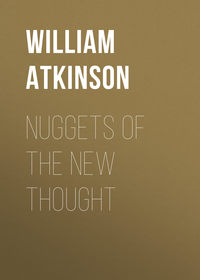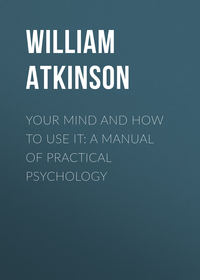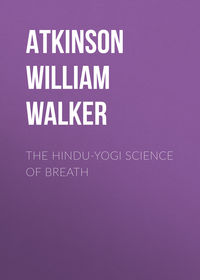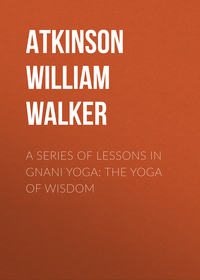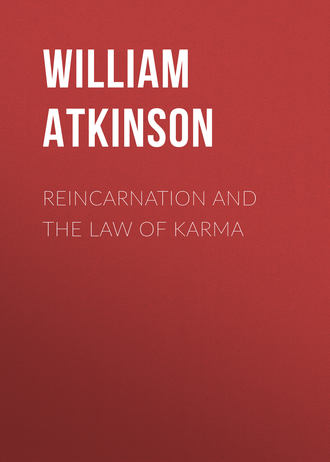 полная версия
полная версияReincarnation and the Law of Karma
Another great school of Hindu philosophy is that known as the Vedanta Philosophy, which many consider the most advanced of all the Hindu systems, and which is rapidly growing in popularity among the educated Hindus, and also among many very intelligent students of philosophical thought in the Western world. Its followers claim that the Vedanta Philosophy has reached the very highest point of philosophical thought, speculation and analysis possible to the human mind of today, and many Western students have claimed that it contains the highest conceptions found in any and all of the great World Philosophies. Be this as it may, it certainly contains much that is the most subtle, refined and keen in the field of philosophical speculative thought of the world, and while, as some claim, it may lack the "appeal to the religious emotions" that some other forms of thought possess, still it proves very attractive to those in whom intellectual development and effort have superseded the "emotional" side of philosophy or religion.
The Vedanta System holds that the Ultimate Reality, or Actual Being, of the universe – the One Absolute Energy or Substance from which all the universe proceeds – is THAT which may be called The Absolute, which is eternal, infinite, indivisible, beyond attributes and qualities, and which is the source of intelligence. The Absolute is held to be One, not Many – Unique and Alone. It is identical with the Sanscrit "Brahman," and is held to be THAT which has been called "The Unknowable"; the "Father"; the "Over-Soul"; the "Thing-in-Itself" – in short, it is THAT which men mean, and have always meant, when they wished to express the ABSOLUTE REALITY. The Vedantists hold that this Absolute Brahman is the essence of "Sat," or Absolute Existence; "Chit," or Absolute Intelligence; and "Ananda," or Absolute Bliss. Without attempting to enter into an analysis, or close exposition, of the Vedanta Philosophy, or so far as concerns the soul, and its destiny, we may say that it holds that there do not exist the countless eternal, immortal souls or Purushas of the Sankhya philosophy, but instead that the individual souls are but the countless "images or reflections" of the Absolute Being, or Brahman, and have their existence only by reason of the Real Existence of the One Only Being. Consequently, the Spirit within the soul of Man, and which is "the soul of his soul," is Divine. The Vedantists admit the existence of a "Logos," or Ishwara, the Lord of the Universe, who is, however, but a manifestation of Brahman – a Great Soul, as it were, and who presides over the evolution of Universes from the Prakriti, and who plays the part of the Demiurge of the old Grecian and Gnostic philosophies. The Vedantists admit the existence (relative) of Prakriti, or Universal Energy, but hold that it is not eternal, or real-in-itself, but is practically identical with Maya, and may be regarded as a form of the Creative Energy of the Absolute, Brahman. This Maya (which while strictly speaking is illusion inasmuch as it has no real existence or eternal quality) is the source of time, space, and causation, and of the phenomenal universe, with its countless forms, shapes, and appearances. The Vedantists teach that the Evolution of the Soul is accomplished by its escaping the folds of Maya, or Materiality, one by one, by means of Rebirths, until it manifests more and more of its Divine Nature; and thus it goes on, and on, from higher to still higher, until at last it enters into the Divine Being and attains Union with God, and is "One with the Father."
Another great Hindu philosophy is the philosophy of Gautama, the Buddha, which is generally known as the Buddhistic Philosophy, or as Buddhism. It is difficult to give a clear idea of Buddhism in a concise form, for there are so many schools, sects, and divisions among this general school of philosophy, differing upon the minor points and details of doctrine, that it requires a lengthy consideration in order to clear away the disputed points. Speaking generally, however, it may be said that the Buddhists start with the idea or conception of an Unknowable Reality, back of and under all forms and activity of the phenomenal universe. Buddha refused to discuss the nature of this Reality, practically holding it to be Unknowable, and in the nature of an Absolute Nothing, rather than an Absolute Something in the sense of "Thingness" as we understand the term; that is to say, it is a No-Thing, rather than a Thing – consequently it is beyond thought, understanding, or even imagination – all that can be said is that it IS. Buddha refused to discuss or teach of the manner in which this Unknowable came to manifest upon the Relative Plane, for he held that Man's proper study was of the World of Things, and how to escape therefrom. In a vague way, however, Buddhism holds that in some way this Unknowable, or a part thereof, becomes entangled in Maya or Illusion, through Avidya or Ignorance, Law, Necessity, or perhaps something in the nature of a Mistake. And arising from this mistaken activity, all the pain and sorrow of the universe arises, for the Buddhist holds that the Universe is a "world of woe," from which the soul is trying to escape. Buddhism holds that the soul Reincarnates often, because of its desires and attractions, which if nursed and encouraged will lead it into lives without number. Consequently, to the Buddhist, Wisdom consists in acquiring a knowledge of the true state of affairs, just mentioned, and then upon that knowledge building up a new life in which desire and attraction for the material world shall be eliminated, to the end that the soul having "killed out desire" for material things – having cut off the dead branch of Illusion – is enabled to escape from Karma, and eventually be released from Rebirth, thence passing back into the great ocean of the Unknowable, or Nirvana, and ceasing to Be, so far as the phenomenal world is concerned, although of course it will exist in the Unknowable, which is Eternal. Many Western readers imagine the Buddhistic Nirvana to be an utter annihilation of existence and being, but the Hindu mind is far more subtle, and sees a vast difference between utter annihilation on the one hand, and extinction of personality on the other. That which appears Nothingness to the Western Mind, is seen as No-Thingness to the Oriental conception, and is considered more of a resumption of an original Real Existence, rather than an ending thereof.
There is a great difference between the two great schools of Buddhism, the Northern and Southern, respectively, regarding the nature of the soul. The Northern school considers the soul as an entity, differentiated from the Unknowable in some mysterious way not explained by Buddha, and yet different from the individual Purusha of the Sankhya school, before mentioned. On the contrary, the Southern school does not regard the soul as a differentiated or distinct entity, but rather as a centre of phenomenal activity saturated or charged with the results of its deeds, and that therefore the Karma, or the Essence of Deeds, may be considered as the soul itself, rather than as something pertaining to it. The Northern school holds that the soul, accompanied by its Karma, reincarnates along the same lines as those taught by all the other Hindu schools of Reincarnation and Karma. But the Southern school, on the contrary, holds that it is not the soul-entity that re-incarnates (for there is no such entity), but that instead it is the Karma, or Essence of Deeds, that reincarnates from life to life, according to its attractions, desires, and merits or demerits. In the last mentioned view of the case, the rebirth is compared to the lighting of one lamp from the flame of another, rather than in the transferring of the oil from one lamp to another. But, really, these distinctions are quite metaphysical, and when refined by analysis become hair-splitting. It is said that the two schools of Buddhism are growing nearer together, and their differences reconciled. The orthodox Hindus claim that Buddhism is on the decline in India, being largely supplanted by the various forms of the Vedanta. On the other hand, Buddhism has spread to China, Japan and other countries, where it has taken on new forms, and has grown into a religion of ritualism, creeds, and ceremonialism, with an accompanying loss of the original philosophy and a corresponding increase of detail of teaching, doctrine and disciple and general "churchiness," including a belief in several thousand different kind of hells. But even in the degenerated forms, Buddhism still holds to Reincarnation as a fundamental doctrine.
In this consideration of the philosophies of India, we do not consider it necessary to go into an explanation of the various forms of religions, or church divisions, among the Hindus. In India, Religion is an important matter, and there seems to be some form of religion adapted to each one of that country's teeming millions. From the grossest form of religious superstition, and crudest form of ceremony and worship, up to the most refined idealism and beautiful symbolisms, runs the gamut of the Hindu Religions. Many people are unable to conceive of an abstract, ideal Universal Being, such as the Brahman of the Hindu Philosophy, and consequently that Being has been personified as an Anthropomorphic Deity, and human attributes bestowed upon him to suit the popular fancy. In India, as in all other countries, the priesthood have given the people that which they asked for, and the result is that many forms of churchly ceremonialism, and forms of worship, maintain which are abhorrent and repulsive to Western ideas. But we of the West are not entirely free from this fault, as one may see if he examines some of the religious conceptions and ceremonies common among ignorant people in remote parts of our land. Certain conceptions, of an anthropomorphic Deity held by some of the more ignorant people of the Western world are but little advanced beyond the idea of the Devil; and the belief in a horned, cloven-hoofed, spiked-tail, red-colored, satyr-like, leering Devil, with his Hell of Eternal Fire and Brimstone, is not so uncommon as many imagine. It has not been so long since we were taught that "one of the chief pleasures of God and his angels, and the saved souls, will be the witnessing of the tortures of the damned in Hell, from the walls of Heaven." And the ceremonies of an old-time Southern negro camp-meeting were not specially elevating or ideal.
Among the various forms of the religions of India we find some of the before mentioned forms of philosophy believed and taught among the educated people – often an eclectic policy of choosing and selecting being observed, a most liberal policy being observed, the liberty of choice and selection being freely accorded. But, there is always the belief in Reincarnation and Karma, no matter what the form of worship, or the name of the religion. There are two things that the Hindu mind always accepts as fundamental truth, needing no proof – axiomic, in fact. And these two are (1) The belief in a Soul that survives the death of the body – the Hindu mind seeming unable to differentiate between the consciousness of "I Am," and "I always Have Been, and always Shall Be" – the knowledge of the present existence being accepted as a proof of past and future existence; and (2) the doctrine of Reincarnation and Karma, which are accepted as fundamental and axiomic truths beyond the need of proof, and beyond doubt – as a writer has said: "The idea of Reincarnation has become so firmly fixed and rooted in the Hindu mind as a part of belief that it amounts to the dignity and force of a moral conviction." No matter what may be the theories regarding the nature of the universe – the character of the soul – or the conception concerning Deity or the Supreme Being – you will always find the differing sects, schools, and individuals accepting Reincarnation and Karma as they accept the fact that they themselves are existent, or that twice one makes two. Hindu Philosophy cannot be divorced from Reincarnation. To the Hindu the only escape from the doctrine of Reincarnation seems to be along the road of the Materialism of the West. From the above statement we may except the Hindu Mohammedans and the native Hindu Christians, partially, although careful observers say that even these do not escape entirely the current belief of their country, and secretly entertain a "mental reservation" in their heterodox creeds. So, you see, we are justified in considering India as the Mother Land of Reincarnation at the present time.
CHAPTER VI
The Modern West
In the modern thought of the Western world, we find Reincarnation attracting much attention. The Western philosophies for the past hundred years have been approaching the subject with a new degree of attention and consideration, and during the past twenty years there has been a marvellous awakening of Western public interest in the doctrine. At the present time the American and European magazines contain poems and stories based upon Reincarnation, and many novels have been written around it, and plays even have been based upon the general doctrine, and have received marked attention on the part of the public. The idea seems to have caught the public fancy, and the people are eager to know more of it.
This present revival of attention has been brought about largely by the renewed interest on the part of the Western world toward the general subject of occultism, mysticism, comparative religion, oriental philosophy, etc., in their many phases and forms. The World's Parliament of Religions, held at the World's Fair in Chicago, in 1893, did much to attract the attention of the American public to the subject of the Oriental Philosophies in which Reincarnation plays such a prominent part. But, perhaps, the prime factor in this reawakened Western interest in the subject is the work and teachings of the Theosophical Society, founded by Madame Blavatsky some thirty years ago, and which has since been continued by her followers and several successors. But, whatever may be the cause, the idea of Reincarnation seems destined to play an important part in the religious and philosophical thought of the West for some time to come. Signs of it appear on every side – the subject cannot be ignored by the modern student of religion and philosophy. Whether accepted or not, it must be recognized and examined.
But the forms of the doctrine, or theory, regarding Reincarnation, vary almost as much in the Modern West as in the various Eastern countries at present, and in the past. We find all phases of the subject attracting attention and drawing followers to its support. Here we find the influence of the Hindu thought, principally through the medium or channel of Theosophy, or of the Yogi Philosophy – and there we find the influence of the Grecian or Egyptian philosophical conceptions manifesting principally through the medium of a number of occult orders and organizations, whose work is performed quietly and with little recognition on the part of the general public, the policy being to attract the "elect few" rather than the curious crowd – and again we find quite a number of persons in America and Europe, believing in Reincarnation because they are attracted by the philosophy of the Neo-Platonists, or the Gnostics of the Early Christian Church, and favoring Reincarnation as a proper part of the Christian Religion, and who while remaining in the bosom of the Church interpret the teachings by the light of the doctrine of Rebirth, as did many of the early Christians, as we have seen.
The Theosophical conception and interpretation appeals to a great number of the Western Reincarnationists, by reason of its wide circulation and dissemination, as well as by the fact that it has formulated a detailed theory and doctrine, and besides claims the benefit of authoritative instruction on the doctrine from Adepts and Masters who have passed to a higher plane of existence. We think it proper to give in some little detail an account of the general teachings of Theosophy on this point, the reader being referred to the general Theosophical literature for more extended information regarding this special teaching.
Theosophy teaches that the human soul is a composite entity, consisting of several principles, sheaths of vehicles, similar to those mentioned by us in our account of Hindu Reincarnation. The Theosophical books state these principles as follows: (1) The Body, or Rupa; (2) Vitality, or Prana-Jiva; (3) Astral Body, or Linga-Sharira; (4) Animal Soul, or Kama-Rupa; (5) Human Soul, Manas; (6) Spiritual Soul, or Buddhi; and (7) Spirit, or Atma. Of these seven principles, the last or higher Three, namely, the Atma, Buddhi, and Manas, compose the higher Trinity of the Soul – the part of man which persists; while the lower Four principles, namely, Rupa, Prana-Jiva, Linga-Sharira, and Kama-Rupa, respectively, are the lower principles, which perish after the passing out of the higher principles at death. At Death the higher principles, or Triad, lives on, while the lower principles of Quarternary dissolve and separate from each other and finally disintegrate, along the lines of a process resembling chemical action.
Theosophy teaches that there is a great stream of Egos, or Monads, which originally emanated from a Source of Being, and which are pursuing a spiral journey around a chain of seven globes, including the earth, called the Planetary Chain. The Life Wave of Monads reaches Globe A, and goes through a series of evolutionary life on it, and then passes on to Globe B, and so on until Globe G is reached, when after a continued life there the Life Wave returns to Globe A, but not in a circle, but rather in a spiral, that is, on a higher plane of activity, and the round begins once more. There are seven Races to be lived through on each globe, many incarnations in each – each Race having seven sub-races, and each sub-race having seven branches. The progress of the Life Wave is illustrated by the symbol of a seven-coil spiral, sweeping with a wider curve at each coil, each coil, however, being divided into a minor seven-coil spiral, and so on. It is taught that the human soul is now on its fourth great round-visit to the Earth, and is in about the middle of the fifth Race of that round. The total number of incarnations necessary for each round is quite large, and the teaching is that none can escape them except by special merit and development. Between each incarnation there is a period of rest in the Heaven World, or Devachan, where the soul reaps the experiences of the past life, and prepares for the next step. The period of rest varies with the degree of attainment gained by the soul, the higher the degree the longer the rest. The average time between incarnations is estimated at about fifteen hundred years. Devachan is thus a kind of temporary Heaven, from whence the soul must again pass in time for a rebirth, according to its merits or demerits. Thus, accordingly, each soul has lived in a variety of bodies, even during the present round – having successively incarnated as a savage, a barbarian, a semi-civilized man, a native of India, Egypt, Chaldea, Rome, Greece, and many other lands, in different ages, filling all kinds of positions and places in life, tasting of poverty and riches, of pleasure and pain – all ever leading toward higher things. The doctrine enunciated by Theosophy is complicated and intricate, and we can do no more than to barely mention the same at this place.
Another Western form of the Oriental Teachings, known as the "Yogi Philosophy," numbers quite a large number of earnest students in this country and in Europe, and has a large circle of influence, although it has never crystallized into an organization, the work being done quietly and the teachings spread by the sale of popular books on the subject issued at nominal prices. It is based on the Inner Teachings of the Hindu Philosophy and is Eclectic in nature, deriving its inspiration from the several great teachers, philosophies and schools, rather than implicitly following any one of them. Briefly stated this Western school of Yogi Philosophy teaches that the Universe is an emanation from, or mental creation of, the Absolute whose Creative Will flows out in an outpouring of mental energy, descending from a condition above Mind, downward through Mind, Physical Energy, and Matter, in a grand Involution or "infolding" of the divine energy into material forms and states. This Involution is followed by an Evolution, or unfoldment, the material forms advancing in the scale of evolution, accompanied by a corresponding Spiritual Evolution, or Unfoldment of the Individual Centres or Units of Being, created or emanated as above stated. The course of Evolution, or rather, that phase of it with which the present human race on earth is concerned, has now reached a point about midway in the scale of Spiritual Evolution, and the future will lead the race on, and on, to higher and still higher planes and states of being, on this earth and on other spheres, until it reaches a point incomprehensible to the mind of man of today, and then still on and on, until finally the souls will pass into the plane of the Absolute, there to exist in a state impossible of present comprehension, and transcending not only the understanding but also the imagination of the mind of man as we know him.
The Yogi Philosophy teaches that the soul will reincarnate on earth until it is fitted to pass on to higher planes of being, and that many people are now entering into a stage which will terminate the unconscious reincarnation, and which enables them to incarnate consciously in the future without loss of memory. It teaches that instead of a retributive Karma, there is a Law of Spiritual Cause and Effect, operating largely along the lines of Desire and what has been called the "Law of Attraction," by which "like attracts like," in persons, environments, conditions, etc. As we have stated, the Yogi Philosophy follows closely the lines of certain phases of the Hindu philosophies from which it is derived, it being, however, rather an "eclectic" system rather than an exact reproduction of that branch of philosophy favored by certain schools of Hindus and known by a similar name, as mentioned in our chapter on "The Hindus" – that is to say, instead of accepting the teachings of any particular Hindu school in their entirety, the Western school of the Yogi Philosophy has adopted the policy of "Eclecticism," that is, a system following the policy of selection, choosing from several sources or systems, rather than a blind following of some particular school, cult or teacher.
The Yogi Philosophy teaches that man is a seven-fold entity, consisting of the following principles, or divisions: 1. The Physical Body. 2. The Astral Body. 3. Prana, or Vital Force. 4. The Instinctive Mind. 5. The Intellect. 6. The Spiritual Mind. 7. Spirit. Of these, the first four principles belong to the lower part of the being, while the latter three are the higher principles which persist and Reincarnate. Man, however, is gradually evolving on to the plane of the Spiritual Mind, and will in time pass beyond the plane of Intellect, which he will then class along with Instinct as a lower form of mentality, he then using his Intuition habitually and ordinarily, just as the intelligent man now uses his Intellect, and the ignorant man his Instinct-Intellect, and the animal its Instinct alone. In many points the Yogi Philosophy resembles the Vedanta, and in others it agrees with Theosophy, although it departs from the latter in some of the details of doctrine regarding the process of Reincarnation, and particularly in its conception of the meaning and operation of the Law of Karma.
There are many persons in the West who hold firmly to Reincarnation, to whom the Hindu conceptions, even in the Western form of their presentation, do not appeal, and who naturally incline toward the Greek conception and form of the doctrine. A large number of these people are generally classed among the "Spiritualists," although strictly speaking they do not fit into that classification, for they hold that the so-called "Spirit World" is not a place of permanent abode, but rather a resting place between incarnations. These people prefer the name "Spiritists," for they hold that man is essentially a spiritual being – that the Spirit is the Real Man – and that that which we call Man is but a temporary stage in the development and evolution of the individual Spirit. The Spiritists hold that the individual Spirit emanated from the Great Spirit of the Universe (called by one name or another) at some distant period in the past, and has risen to its present state of Man, through and by a series of repeated incarnations, first in the form of the lowly forms of life, and then through the higher forms of animal life, until now it has reached the stage of human life, from whence it will pass on, and on, to higher and still higher planes – to forms and states as much higher than the human state than man is above the earthworm. The Spiritists hold that man will reincarnate in earthly human bodies, only until the Spirit learns its lessons and develops sufficiently to pass on to the next plane higher. They hold that the planets and the countless fixed stars or suns, are but stages of abode for the evolving Spirit, and that beyond the Universe as we know it there are millions of others – in fact, that the number of Universes is infinite. The keynote of this doctrine may be stated as "Eternal Progression" toward the Divine Spirit. The Spirits do not insist upon any particular theory regarding the constitution of the soul – some of them speak merely of "soul and body," while others hold to the seven-fold being – the general idea being that this is unimportant, as the essential Spirit is after all the Real Self, and it matters little about the number or names of its temporary garments or vehicles of expression.




